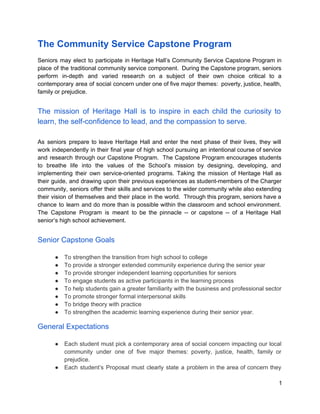The Community Service Capstone Program at Heritage Hall allows seniors to conduct an in-depth research project on a social issue of their choosing, such as poverty, justice, health, family, or prejudice. Students perform research, interviews, and community service work on their topic. The goal is for students to strengthen their learning experience and better understand how to create positive change in the community. Students must write a research paper and defend their thesis in an exit interview with faculty. This provides seniors an opportunity to further develop their skills and contribute to important social issues before graduating.





